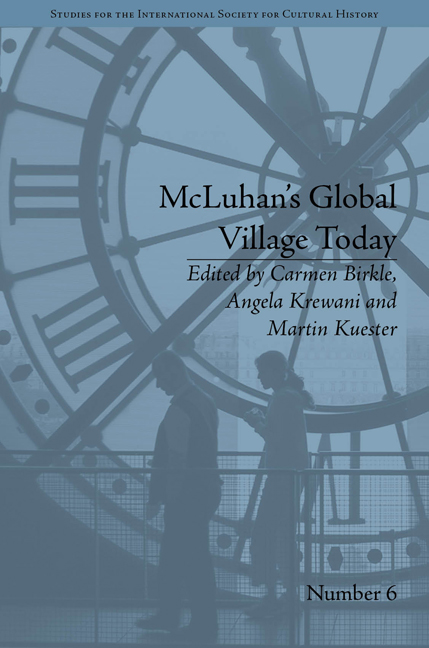Book contents
- Frontmatter
- CONTENTS
- List of Contributors
- List of Figures
- McLuhan's Global Village Today: An Introduction
- Part I McLuhan and Media Theory
- 1 In-Corporating the Global Village
- 2 Metaphorical Effects: McLuhan's Media
- 3 Hot/Cool vs Technological/Symbolic: McLuhan and Kittler
- 4 Global Immediacy
- 5 The Complementary Aspects of Marshall McLuhan and Postmodernism in the Literary Study of the Internet: Exemplified in the Rhizome Theory of Gilles Deleuze and Félix Guattari
- 6 Dubjection: A Node (Reflections on Web-Conferencing, McLuhan and Intellectual Property)
- Part II McLuhan and Literature
- Part III McLuhan and Technical Media
- Notes
- Index
1 - In-Corporating the Global Village
from Part I - McLuhan and Media Theory
- Frontmatter
- CONTENTS
- List of Contributors
- List of Figures
- McLuhan's Global Village Today: An Introduction
- Part I McLuhan and Media Theory
- 1 In-Corporating the Global Village
- 2 Metaphorical Effects: McLuhan's Media
- 3 Hot/Cool vs Technological/Symbolic: McLuhan and Kittler
- 4 Global Immediacy
- 5 The Complementary Aspects of Marshall McLuhan and Postmodernism in the Literary Study of the Internet: Exemplified in the Rhizome Theory of Gilles Deleuze and Félix Guattari
- 6 Dubjection: A Node (Reflections on Web-Conferencing, McLuhan and Intellectual Property)
- Part II McLuhan and Literature
- Part III McLuhan and Technical Media
- Notes
- Index
Summary
One of the signal questions that emerges as we look back, on this occasion of his centennial, at the trajectory of Marshall McLuhan's career, is why he turned to the idea of the corporate in the second half of his career, that is, in the period after the 1964 publication of Understanding Media. Not only did he publish two major works in this area – Culture is Our Business (1970), which examines corporate advertising, and Take Today: The Executive as Dropout (1972), which investigates corporate structures – but he was also involved with publishing the Dew Line Newsletters, which were directed at business corporations and published between 1968 and 1970. On one level, these publications offered McLuhan an opportunity to revisit works that he had previously published: Culture is Our Business is largely an updating of The Mechanical Bride, published twenty years earlier, and Take Today is a rewriting of The Gutenberg Galaxy, published in 1962. On another level, the works are counter-intuitive in the classic McLuhanesque style: Take Today has more to do with cultural analysis than business management, and the Dew Line Newsletters are more an expression of McLuhan's interest in ‘typographic man’ than in corporate affairs.
This brings me back to my opening question: how can we understand these works from the later part of McLuhan's career in the context of his total body of writing?
- Type
- Chapter
- Information
- McLuhan's Global Village TodayTransatlantic Perspectives, pp. 7 - 14Publisher: Pickering & ChattoFirst published in: 2014



